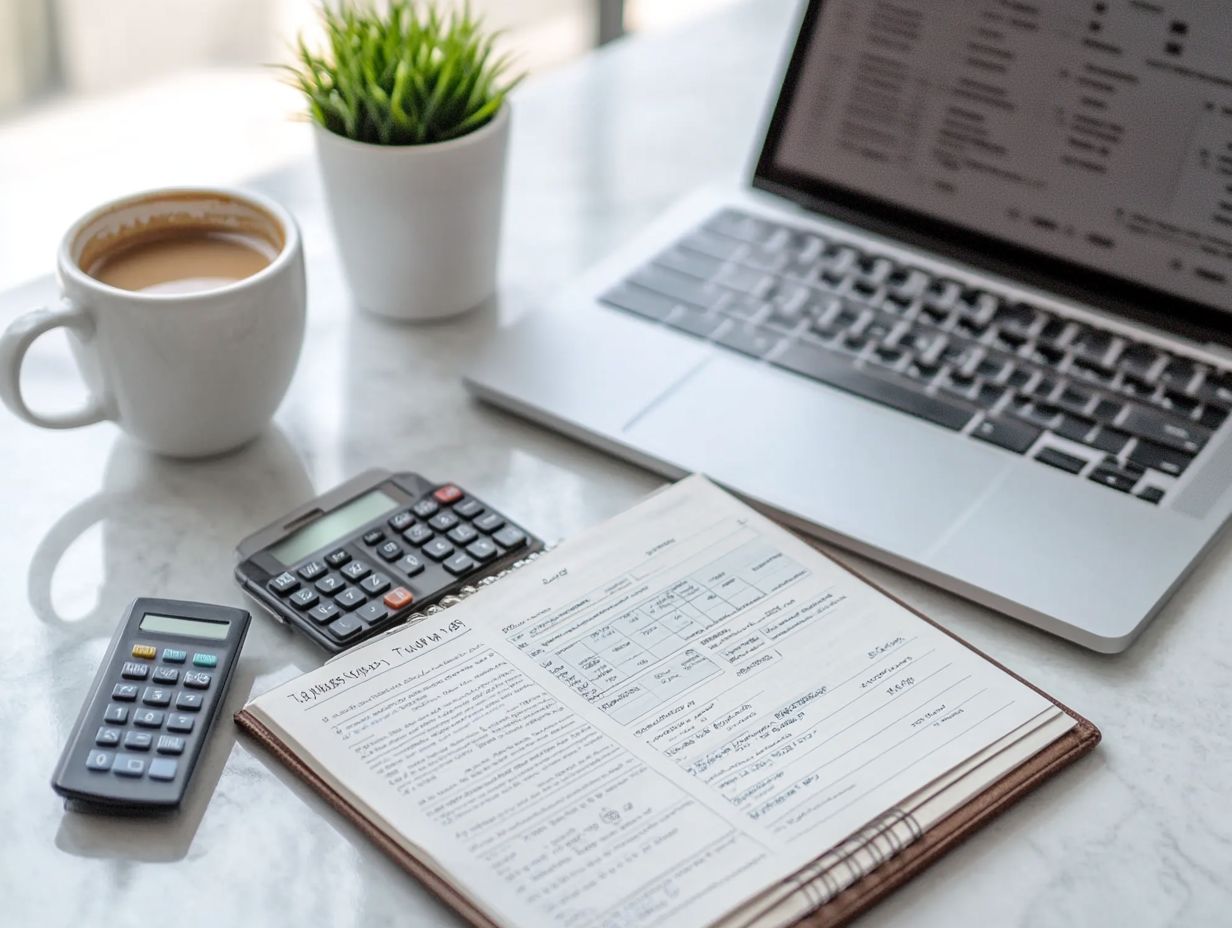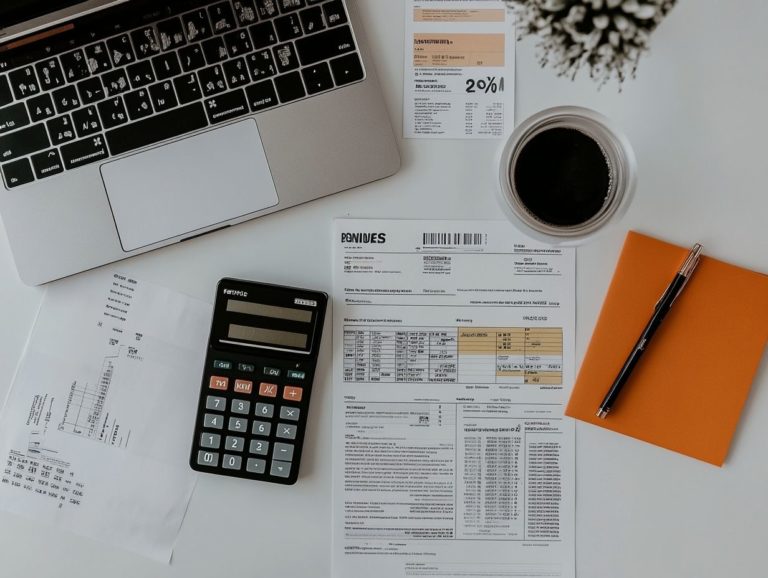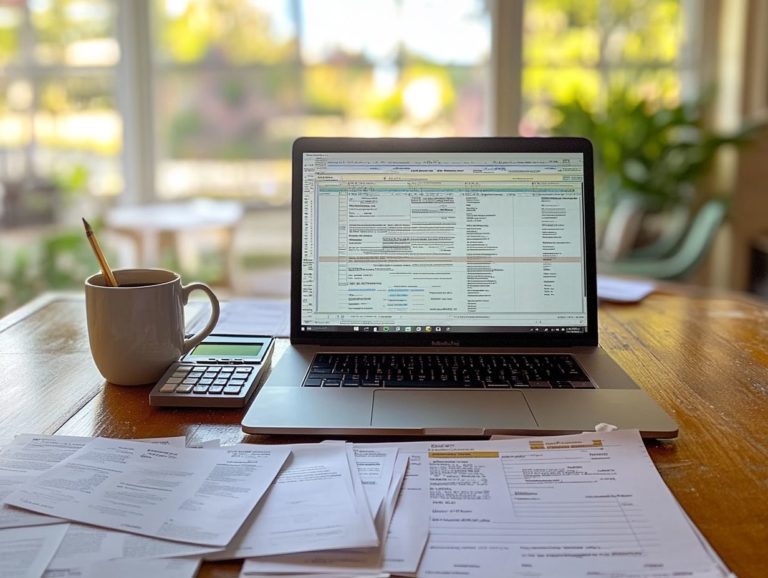5 Crucial Tax Tips for Freelancers
Don t let tax season catch you off guard! Navigating tax season can feel daunting, particularly when you’re a freelancer juggling your own income and expenses.
Grasping the nuances of self-employment taxes is essential for maintaining compliance and optimizing your deductions. Knowing how much tax to expect is crucial for freelancers.
This article delves into five vital tax tips specifically crafted for freelancers, covering everything from careful income tracking to understanding your estimated tax obligations.
Whether you’re just starting out in the freelancing world or aiming to fine-tune your strategy, these insights will equip you to be well-prepared and organized when tax time arrives.
Contents
- Key Takeaways:
- 1. Keep Track of All Income and Expenses
- 2. Understand Tax Deductions for Freelancers
- 3. Pay Estimated Taxes Quarterly
- 4. Set Aside Money for Taxes
- 5. Consider Hiring a Tax Professional
- What Is Considered Self-Employment Income for Freelancers?
- What Documents Should Freelancers Keep for Tax Purposes?
- How Can a Freelancer Stay Organized for Tax Season?
- Frequently Asked Questions
- What are the top 5 crucial tax tips for freelancers?
- How important is it for freelancers to keep accurate records for tax purposes?
- What expenses can freelancers deduct on their taxes?
- Why is it crucial for freelancers to set aside money for taxes?
- How can freelancers pay their estimated taxes?
- Should freelancers seek professional help when it comes to filing their taxes?
Key Takeaways:

- Keep detailed records of all income and expenses to accurately report taxes and maximize deductions.
- Deduct business expenses like home office, equipment, and travel expenses to lower the amount of tax you owe.
- Pay estimated taxes quarterly to help avoid penalties and relieve the burden of a large tax bill at the end of the year.
1. Keep Track of All Income and Expenses
For freelancers navigating the intricate world of personal finance, it’s essential to meticulously track all sources of income and expenses. Tracking details accurately helps you report correctly on tax forms like Schedule C.
This ensures compliance and maximizes deductions for expenses like your home office. By keeping organized financial records, you streamline tax preparation and gain valuable insights into your business performance.
Consider leveraging various tools and apps, such as QuickBooks Self-Employed, FreshBooks, and Wave, which can effortlessly simplify tracking your income and expenses. These platforms allow you to efficiently categorize your earnings, from client payments to side projects.
Be sure to document important expenses, including:
- Materials
- Software subscriptions
- Travel costs
These can accumulate into significant savings come tax season. Thorough documentation becomes particularly advantageous during IRS audits, providing legitimate proof of your earnings and deductions.
This diligence safeguards you against potential penalties and discrepancies, ensuring peace of mind as you navigate your financial landscape.
2. Understand Tax Deductions for Freelancers
Understanding the tax deductions available to you as a freelancer is crucial for minimizing your tax liability. By capitalizing on various deductions like the home office deduction, health insurance premiums, and contributions to retirement accounts you can also take advantage of credits like the child tax credit and the earned income tax credit.
Effectively leveraging these deductions can lead to a significant reduction in your taxable income. For instance, the home office deduction allows you to write off a portion of your rent or mortgage when you work from home.
Expenses for business supplies, software subscriptions, and travel can lower your tax bills. To claim these deductions correctly, it’s essential to maintain meticulous records of your expenses and use the appropriate forms when filing.
Given the complexities of tax regulations, consulting a tax professional can be immensely beneficial. They can provide tailored guidance that aligns with your unique situation, ensuring compliance while maximizing your potential savings.
3. Pay Estimated Taxes Quarterly
Paying estimated taxes quarterly is an essential responsibility for you as a freelancer. It allows you to manage your federal income tax liability throughout the year, preventing any unwelcome surprises come tax season and minimizing the risk of penalties that could arise from IRS audits for underpayment.
This process begins with accurately assessing your expected annual income, which can vary significantly depending on your client work, projects, and seasonal trends. Keeping detailed records of your earnings and expenses will make it easier for you to estimate your net income. Once you have a clear picture, you can apply the appropriate tax rates to calculate the estimated payments owed each quarter.
Neglecting these obligations could lead to hefty fines and interest charges from the IRS. To stay on track, consider:
- Setting aside a specific percentage of each payment you receive
- Using accounting software for better oversight
- Consulting a tax professional for tailored advice and reminders about upcoming payment deadlines
4. Set Aside Money for Taxes

Setting aside money for taxes is a smart personal finance strategy that allows you, as a freelancer, to meet your tax obligations without unnecessary stress. You can avoid potential cash flow issues by covering your estimated taxes and payments when tax season rolls around.
To manage these funds effectively, consider establishing separate savings accounts specifically for your tax savings. This keeps your tax funds separate from your daily spending. You can also track your progress toward your tax goals more easily.
Using a percentage allocation method can simplify your budgeting even further. By setting aside a fixed percentage of each payment you receive typically recommended at 25-30% you can consistently build a tax reserve without the last-minute scramble.
Accurately estimating your tax liability often means reviewing your past income alongside your current earnings. This way, you can make informed adjustments throughout the year. Since income can fluctuate, it’s essential to regularly reassess your savings strategy. Adjust your allocations to account for any variations in income, maintaining financial stability and keeping your tax situation in check.
5. Consider Hiring a Tax Professional
Engaging a tax professional can significantly elevate your ability to navigate the complexities of tax rules. This is especially true when it comes to getting the most back on your taxes on Schedule C, which is a tax form used by freelancers to report income and expenses, ensuring compliance during IRS audits, and optimizing your retirement account contributions for future financial security.
By leveraging their expertise, you can gain personalized advice tailored to your unique financial situation, empowering you to make informed decisions that genuinely impact your bottom line.
When selecting the right tax professional, consider factors such as their experience with freelance work, specialization in tax law relevant to your industry, and the availability of ongoing support.
Essential questions to ask might include inquiries about fee structures, access to audit support, and how they stay updated on changes in tax laws. This proactive approach not only fosters a deeper understanding of your tax obligations but also provides peace of mind, knowing you have expert guidance during critical times.
What Is Considered Self-Employment Income for Freelancers?
Self-employment income includes all your earnings from freelancing activities and is typically reported on forms like the 1099-NEC. This includes freelance income from various sources and other income types, such as capital gains, which might influence your overall tax liability.
Beyond freelance work, you might also generate income through consulting fees, online sales, or various side gigs. Each of these revenue streams requires careful tracking and reporting to meet your tax obligations.
When tax season rolls around, it’s vital to report every source of income. The IRS expects complete and transparent reporting. Overlooking any earnings could lead to significant repercussions, including steep penalties or even an audit.
Keeping clear records not only helps you stay organized but also builds trust with tax authorities. This approach minimizes the risk of scrutiny, allowing you to focus on growing your business instead of stressing over tax-related issues.
What Are the Most Common Deductions for Freelancers?
The most common deductions for freelancers include the home office deduction, various business expenses, health insurance premiums, and contributions to retirement accounts. When properly documented and claimed, these can significantly reduce your taxable income and overall tax liability.
To truly harness these benefits, it’s essential to understand how to categorize and substantiate your expenses effectively. For instance, you can claim the home office deduction if you have a designated space in your home used exclusively for business. Business expenses can cover anything from software subscriptions to marketing costs, broadening your deductible options.
You can also deduct health insurance premiums, provided you’re not eligible for another employer’s plan. Contributions to retirement accounts, such as a SEP IRA, help you build long-term savings and lower your current-year tax obligations.
Maintaining meticulous records, including receipts and tracking expenditures, is crucial to support these deductions in the event of an audit. This level of organization can transform the daunting tax season into a more manageable experience, ensuring compliance with IRS regulations.
How Can a Freelancer Determine Their Estimated Tax Payments?

Freelancers can determine their estimated tax payments by projecting their expected income for the year while factoring in any business expenses and last year’s tax liability. This step is crucial for accurate IRS reporting and compliance when filing Schedule C.
To get started, project your total income and subtract any relevant business expenses to arrive at your net earnings. It s wise to consult resources like the IRS Form 1040-ES, which offers guidance for self-employed individuals, or use an online tax calculator tool to streamline the process.
Regularly assessing your financial situation is essential. Since your income may fluctuate throughout the year, adjusting your estimated payments accordingly can help you avoid underpayment penalties. Keeping careful records will help you evaluate your finances.
What Are the Penalties for Not Paying Estimated Taxes?
Neglecting to pay your estimated taxes can lead to significant penalties from the IRS, adding to your tax liability and potentially triggering audits. This can create additional financial stress, especially for freelancers who might not have set aside sufficient funds for their tax obligations.
These penalties can vary based on the amount owed and how long the underpayment persists, potentially climbing up to 25% of the unpaid tax. To mitigate these risks, it’s wise to schedule regular quarterly payments and routinely assess your income to avoid unexpected tax burdens.
Utilizing accounting tools or enlisting the help of a tax professional can help you maintain accurate records and ensure timely payments, alleviating the rush and pressure as deadlines loom.
By taking a proactive approach and establishing a structured payment plan, you can navigate your financial obligations more smoothly, allowing you to focus on your creative pursuits.
What Documents Should Freelancers Keep for Tax Purposes?
As a freelancer, you should keep a variety of documents for tax purposes. This includes receipts for business expenses and income statements like the 1099-NEC. You should also keep copies of your filed Schedule C, which is a form used by freelancers to report income. Having these on hand will facilitate accurate IRS reporting and provide a solid defense against any potential audits.
In addition to these records, you should also keep invoices and payment confirmations for the services you’ve rendered. These documents back up your income claims. Documentation related to specific deductions like bills for utilities, software subscriptions, and travel expenses should also be organized systematically.
You should retain these records for at least three years, as this aligns with the IRS s audit timeframe. Creating digital backups ensures that your documents remain accessible and protected, making it much easier to retrieve important information when needed. This approach streamlines the entire tax preparation process, allowing you to focus more on what you do best.
How Can a Freelancer Stay Organized for Tax Season?
Staying organized for tax season is vital for freelancers. It allows you to efficiently gather necessary documents, such as receipts for business expenses and records for tax deductions. This ultimately simplifies the filing process and reduces stress during this hectic time.
To achieve this, consider incorporating digital tools, like cloud storage and expense tracking apps; they can be immensely beneficial. A systematic filing system ensures that critical documents are easily accessible and properly categorized, minimizing that last-minute scramble you dread.
Regularly reviewing your financial records throughout the year promotes accountability. This proactive approach helps you identify any missing paperwork well before the deadline. This not only alleviates the burden of a rushed tax season but also instills confidence in you as a freelancer, enabling you to manage your finances more effectively.
Frequently Asked Questions

What are the top 5 crucial tax tips for freelancers?
The top 5 crucial tax tips for freelancers include keeping accurate records, understanding deductible expenses, setting aside money for taxes, paying estimated taxes, and seeking professional help if needed. Click here for more tips!
How important is it for freelancers to keep accurate records for tax purposes?
Keeping accurate records is extremely important as it helps track income and expenses, ensuring that all tax deductions are accounted for. This can save freelancers from potential audits and penalties. Click here for more tips!
What expenses can freelancers deduct on their taxes?
Freelancers can deduct various expenses, including home office expenses, office supplies, computer and internet expenses, travel expenses, and business insurance. It’s crucial to track these expenses throughout the year. Click here for more tips!
Why is it crucial for freelancers to set aside money for taxes?
Freelancers are responsible for paying their own taxes, unlike traditional employees who have taxes withheld from their paychecks. It’s essential to set aside a portion of your income for taxes throughout the year to avoid a large tax bill at the end of the year. Click here for more tips!
How can freelancers pay their estimated taxes?
Freelancers can pay their estimated taxes online through the IRS website or by mailing in a check. It’s important to pay these taxes on time to avoid penalties and interest. Click here for more tips!
Should freelancers seek professional help when it comes to filing their taxes?
Yes, it’s highly recommended for freelancers to seek professional help when filing their taxes. Tax laws and regulations can be complex, and a tax professional can help ensure that freelancers take advantage of all available deductions and credits. Click here for more tips!
Act now to avoid headaches later! Consider subscribing to our newsletter for more insights or download our checklist for tax preparation.






